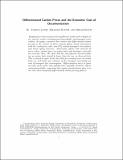Differentiated Carbon Prices and the Economic Cost of Decarbonization
Author(s)
Landis, Florian; Rausch, Sebastian; Kosch, Mirjam
Download10640_2017_130_ReferencePDF.pdf (867.6Kb)
PUBLISHER_POLICY
Publisher Policy
Article is made available in accordance with the publisher's policy and may be subject to US copyright law. Please refer to the publisher's site for terms of use.
Terms of use
Metadata
Show full item recordAbstract
mploying a numerical general equilibrium model with multiple fuels, end-use sectors, heterogeneous households, and transport externalities, this paper examines three motives for differentiated carbon pricing in the context of Swiss climate policy: fiscal interactions with the existing tax code, non-CO₂ related transport externalities, and social equity concerns. Interaction effects with mineral oil taxes reduce carbon taxes on motor fuels and transport externalities increase them. We show that the cost-effective overall carbon tax on motor fuels should be lower than the one on thermal fuels. This is found in spite of the fact that pre-existing taxes on motor fuels are well below our estimate of the transport externality per unit of transport fuel consumption. Differentiating taxes in favor of motor fuels yields only slightly more equitable incidence effects among households, suggesting that equity considerations play a minor role when designing differentiated carbon pricing policies.
Date issued
2017-03Department
MIT Energy InitiativeJournal
Environmental and Resource Economics
Publisher
Springer-Verlag
Citation
Landis, Florian, Sebastian Rausch, and Mirjam Kosch. “Differentiated Carbon Prices and the Economic Cost of Decarbonization.” Environmental and Resource Economics 70, no. 2 (March 24, 2017): 483–516.
Version: Author's final manuscript
ISSN
0924-6460
1573-1502